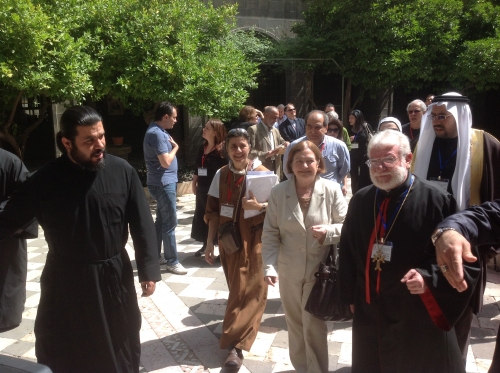Paul Larudee has been part of the delegation that with Mairead Corrigan Maguire, Nobel Peace Prize Laureate, has visited Syria in early May. Paul wrote various press releases that Pressenza published together with the articles of Marinella Correggia, who was part of the same delegation. In this interview, we will attempt to take stock of the situation.
Paul, can you describe briefly how the trip was born and how it developed?
Mother Agnes-Mariam of the Syrian group Mussalaha made some travels to Australia, the UK and Canada and possibly other places in 2012 in order to present their view of the situation, to counter false information and to develop international support for an end to the violence.
Mussalaha means “reconciliation” in Arabic, and the group works to develop reconciliation in local conflicts throughout Syria. It considers itself non-political and welcomes the participation of all groups. It seems to have achieved numerous successes and has the trust of most Syrians, which is an astonishing accomplishment.
Mother Agnes-Mariam is the Mother Superior of the Melkite Greek Catholic Monastery of St. James the Mutilated in Qara, a town near Homs. Mussalaha has a strong Christian element but almost all Syrian confessions and ethnicities participate.
Mother Agnes met with Nobel Peace Laureate Mairead Maguire during her travels, and the two decided to create an international delegation to go to Syria by extending invitations to selected persons. The group was originally scheduled to visit four cities in February, but this was not possible, so the visit was rescheduled to May, with only Lebanon and Damascus on the itinerary.
How was the general situation? Can you tell us something about the humanitarian situation you found in Lebanon and Syria?
I was in Lebanon during the 2006 Israeli invasion, when a million Lebanese fled the fighting in the south. This was similar except that the refugees were Syrian and did not arrive all at the same time. The UN lists a half million in Lebanon, but those are only the registered ones. The registration process is months behind schedule, and the UN is charging each refugee family $100 to register, so there are by some estimates another half million that have not registered.
Some of the refugees have their own resources. Many are being taken care of by friends and family. Private faith-based organizations are also doing a lot. However, these are means and will soon run out of funds. In addition, many of the refugees are living in squalid camps that do not meet the minimum international standards for lodging and hygiene.
It is the job of the UN High Commissioner on Refugees and the donor nations to care for these refugees, but they are not providing adequate services. If the donor nations spend only 10% of the money they provide to the fighters, the needs can be met. The UN has registered a total of 1.5 million refugees in all the border countries, but the real number is probably closer to 2.5 million.
In Syria, the numbers of displaced persons is much higher, probably between four and seven million. Unfortunately, very little aid is reaching them from outside, partly because of the embargo and partly because many of the humanitarian agencies refuse to try. Syrians are very resourceful, but there has been a drought in some parts of the country, which makes matters even more difficult. Nevertheless, many prefer to stay where they can inside Syria rather than to become external refugees.
The delegation concluded its work with a statement: can you list the main observations and requests?
The statement is long but worth reading. It has five main points:
1. End foreign intervention and the flow of arms.
2. Stop the distortion of information and allow all voices to be heard.
3. End the economic sanctions that are causing hardship for the Syrian people.
4. Provide proper care of the refugees and displaced persons.
5. End the violence and find peaceful solutions, to be decided by the Syrian people alone.
What are, in your opinion, the chances of a peaceful settlement of this crisis?
Eventually there will be a peaceful settlement. No conflict has lasted a thousand years. However, this conflict would end much faster and with much less loss of life if foreign interference were to end. If that happens, Syrians will solve their problems amongst themselves, which requires refusing to reject the viewpoints of any group in Syria. They all must listen to each other and find a way out of the crisis together.
Is there a personal experience you would like to convey to our readers?
I have several powerful memories, including a family in Lebanon that has been living in the space between two cars for two months and a mother that watched her 9-year-old son die in her arms. I wish we could perform an operation on every politician and leader to remove their arrogance before they take office and then force them to speak personally to every victim they create. Short of that, the rest of us have to try to be such persons and bring the voices of the victims to those who need to hear them.






